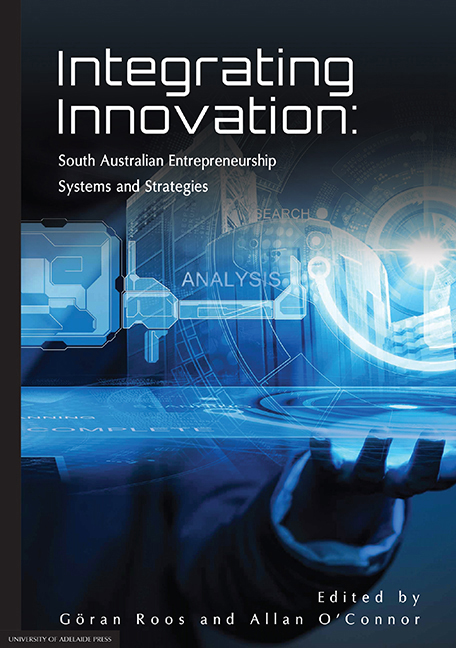Book contents
- Frontmatter
- Contents
- Chapter Abstracts
- Notes on Contributors
- Foreword
- Introduction
- Part 1 Regional-level perspectives
- 2 Moving beyond policy path dependency: An approach to fostering innovation in South Australia
- 3 A patent perspective of South Australian innovation: An indicator within the regional innovation system story
- 4 Innovation system symbiosis: The impact of virtual entrepreneurial teams on integrated innovation and regional innovation systems
- Part 2 Firm-level perspectives
- Part 3 Innovation management perspectives
- Conclusion
2 - Moving beyond policy path dependency: An approach to fostering innovation in South Australia
from Part 1 - Regional-level perspectives
Published online by Cambridge University Press: 05 February 2016
- Frontmatter
- Contents
- Chapter Abstracts
- Notes on Contributors
- Foreword
- Introduction
- Part 1 Regional-level perspectives
- 2 Moving beyond policy path dependency: An approach to fostering innovation in South Australia
- 3 A patent perspective of South Australian innovation: An indicator within the regional innovation system story
- 4 Innovation system symbiosis: The impact of virtual entrepreneurial teams on integrated innovation and regional innovation systems
- Part 2 Firm-level perspectives
- Part 3 Innovation management perspectives
- Conclusion
Summary
Introduction
The history we experience is the result of the ideas we pursue.
(Dwight Waldo, 1952, p. 99)Stemming from the 1990s, the work of Nelson and Winter (1977), Freeman (1985) and Lundvall (1992) on National Systems of Innovation has been used to argue for a new and more holistic perspective of the roles of policy governance and institutions for innovation. Despite this being acknowledged in South Australia's economic policy discourse at the time, this chapter considers why the state continues to struggle to apply and implement a more holistic approach to stimulating and supporting innovation across the economy. John Dryzek (2001) observes that ‘a policy discourse will always feature particular assumptions, judgements, contentions, dispositions, and capabilities’ (p. 658) and is often reinforced by the advocacy of strong industry associations and economic ideologies.
Particularly influential in regional innovation policy discourse has been the work of the Organisation for Economic Co-operation and Development [OECD], whose arguments asserting the primary importance of science and technology to regional economic growth have left an enduring legacy of investments heavily weighted towards science, technology and engineering disciplines and industries in an effort to foster innovation and develop South Australia's pool of human capital. Whilst significant immediate opportunities exist for these industries, it is clear that this focus has distracted South Australian policy makers from considering the importance of fields of knowledge within the Humanities, Arts and Social Sciences [HASS] and the valuable role they can play in the state's innovation system and longterm economic development.
Interpreting the concept of innovation
In 2000, at the time of Australia's National Innovation Summit, the OECD led the discourse and research on the role of innovation in economic development. At that time, as now, many governments viewed the OECD's work as a benchmark with which to compare policy experiences, seek answers to common problems, identify good practice (as determined by the theoretical and ideological viewpoints of the dominant member countries) and co-ordinate domestic and international policies. The growing body of research undertaken by the OECD has provided policy makers with reason to increase its support and investment in industries that rely on science and technology as their primary knowledge base and input to production.
Information
- Type
- Chapter
- Information
- Integrating InnovationSouth Australian Entrepreneurship Systems and Strategies, pp. 35 - 62Publisher: The University of Adelaide PressPrint publication year: 2015
